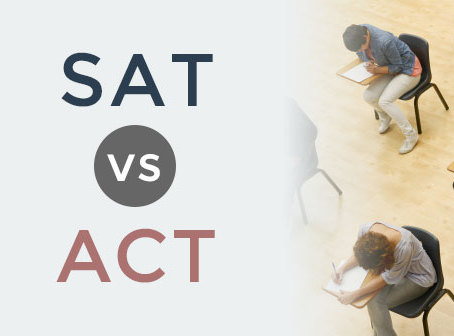For some students, choosing between the SAT and ACT is like choosing between doing the dishes and taking out the garbage. Both exams are fraught with challenges and pressures that make them anything but fun.
Ideally, though, students should view standardized testing as an opportunity. A disappointing grade in 9th grade chemistry class isn’t going away. But, a fantastic score on the SAT or ACT may still lie ahead. Students who prepare, practice, and study smartly can, in very short order, achieve scores that will enhance their college applications.
For decades, the SAT was the most dominant test in college admissions. The ACT was popular in mainly the Midwest. In recent years, the ACT has expanded to the point at which about as many students take the ACT in the United States as take SAT. Regardless of the number of test-takers, colleges have always viewed the two equally. Admissions offices truly do not care which scores an applicant submits.
As a result, one of the most difficult standardized test question that students have to answer is, which test will I take?
Unlike on the exams themselves, there’s no right or wrong choice. Students should choose the one one which they feel they will do the best. Though the structure and pacing of the exams differ, the ACT and SAT share more similarities than differences. In fact, about 80% of the content overlaps between the two tests.
For that reason, the best way to figure out which test is the better fit for you is to take a diagnostic SAT and a diagnostic ACT so that you can see firsthand which testing experience you prefer.
In the meantime, knowing what to expect on the ACT and SAT will help you get a sense of which exam is likely to better suit your strengths.
Pacing
In a nutshell, the biggest difference between the two exams is that the SAT asks trickier, more nuanced questions—but provides you with over 1/3 more time to answer them. By contrast, the ACT’s questions are relatively straightforward but come with a time crunch.
ACT
- Tighter time limits on each section mean you must make efficient decisions, take shortcuts, and avoid digging too deeply into a single question.
- Most students find that the pacing of the English section of the ACT is comfortable, but the Math, Reading, and Science sections require more practice. Not only are the Reading and Science sections the areas where you’re likely to feel the tightest time crunch—assuming you're taking the optional Science section—but they're also the final two sections of the exam. You may need to overcome mental fatigue in order to maintain a quick pace on those sections. But this is doable. Timed practice tests are a great way to build stamina and become comfortable with the flow of a full-length exam.
SAT
- On the SAT, you can afford to work a bit more slowly, giving each question more thought. Although you’ll have more time to spare on each section, the more generous time limits are balanced by more challenging passages and questions, which means you must put your extra time to good use. You will need to learn to tackle the SAT’s trickier question prompts by using strategies to break down what the test is asking.
- Because the SAT is an adaptive test, many students find that finishing the higher-difficulty second modules within the time limits can be a challenge. Plus, there are fewer questions overall, which means it's important to get off to a strong start and have a plan for monitoring your pace on each module. Again, timed practice tests can help you become comfortable with the flow of a full-length exam.
Superscoring
Superscoring is when a college combines your highest section scores across multiple test dates. Most universities superscore the SAT. Many universities superscore the ACT, but some do not. If you plan to apply to schools that superscore the SAT but not the ACT, you may want to think about whether superscoring is likely to give you an edge.
It’s a good idea to consult your college counselor to find out how the schools on your list treat the ACT and SAT and, if so, whether this will affect your choice of test.
Content and testing strategies
Consider your strengths and weaknesses in the main subject areas tested on the ACT and SAT: English, Math, Reading, and Science.
English/Writing
- Don’t worry too much about this section when deciding which exam to take. The English section of the ACT and the grammar/rhetoric questions on the Reading & Writing section of the SAT are the two sections that have the most in common.
- Both tests require you to read passages, think about the development of ideas within the passages, and apply your understanding of grammar rules to fix errors.
Math
- Algebra 2 makes up the majority of the Math content of both exams, but a helpful deciding factor between the ACT and SAT can be whether you feel more confident with Algebra 1 concepts or Geometry concepts. On the SAT, basic Algebra 1 reasoning skills apply to about 80% of the questions on the test, whereas you’ll encounter a greater number of geometry problems on the ACT. Furthermore, the SAT includes a list of geometry formulas you can access during each Math module. Despite testing students on a wider range of geometry concepts, the ACT does not give students a formula page.
- The SAT includes a handful of student-produced questions within each Math module. These problems can require you to adjust your approach if you’re accustomed to relying on shortcuts to narrow down multiple-choice options.
Reading
- The ACT is a more accelerated test that focuses on factual recall, and contains longer passages of about 800 words. If you can quickly read and locate information in a passage, the ACT may be the better test for you.
- The SAT, on the other hand, may be a better fit if you’re a more thorough, analytical thinker. The SAT gives you shorter passages of 25-250 words and more time per passage, but requires you to draw deeper inferences and conclusions from textual evidence.
- The SAT also includes vocabulary questions, which can be challenging if you’re not comfortable with more obscure vocabulary and performance on these questions can be one of the more time-consuming areas to improve.
Science
- Science on the ACT is now optional, but whether you decide to complete that section will depend on whether the schools you're applying to require it. That means that if you choose to take the ACT, you may need to plan on taking Science. Some people assume that students who are good at science should automatically take the ACT because the ACT has a Science section and the SAT does not. While it’s true that students who enjoy science may find this section of the ACT especially engaging, students who don’t enjoy science will be relieved to hear that the section doesn’t require much scientific knowledge at all. To do well, you simply need to know how to work efficiently across a fast-paced section. Success on this section mainly boils down to your reading speed and your ability to quickly find data points within charts and graphs.
- The SAT builds chart interpretation questions into its Reading and Writing section, so you won’t entirely be able to avoid data-based questions by choosing the SAT. Once again, it comes down to pacing: you’ll have more time to tackle these types of questions on the SAT.
If you’re still not sure where to start, completing ACT and SAT diagnostic exams is the best first step you can take. Whichever exam you choose, make sure to plan ahead by mapping out a testing timeline and a study plan to help you get ready for test day.
Need more individualized advice?
The recommendations above are general suggestions. If you have specific questions, reach out to our experts here. We’re happy to help in any way we can.
About ArborBridge
ArborBridge is the global leader in innovative, digital, one-on-one tutoring. With nearly a decade of experience teaching students online, ArborBridge supports students of all kinds: home schoolers, AP students, test preppers, and more. Our tutors specialize in creating personalized plans and in providing compassionate support for students and families.






